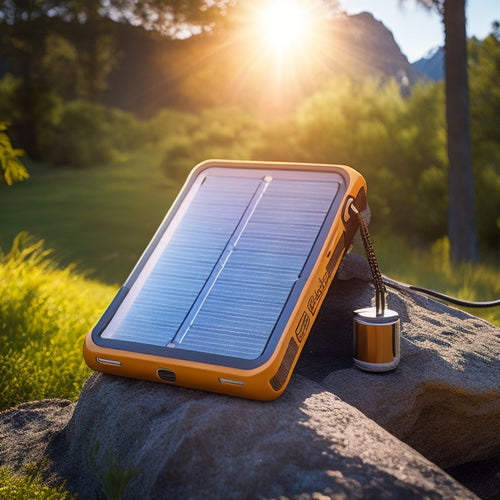
What Are the Best Portable Solar Chargers
Share
When selecting the best portable solar charger for your needs, consider trusted brands like Anker, Goal Zero, and Suaoki, which offer high-quality products with excellent customer service. Key features to look for include power output capacity, size, and weight, durability and water resistance, and charging speed. Look for IP67 or higher ratings, rugged construction, and efficient solar panels. You'll want to balance power output with portability and consider your budget. By assessing these factors, you'll find a reliable solar charger that meets your power needs on-the-go. Now, examine your options and find the perfect fit.
Key Takeaways
- Consider trusted brands like Anker, Goal Zero, and Suaoki for high-quality portable solar chargers with excellent customer service.
- Look for chargers with high power output capacity (measured in watts) for efficient device recharging, compact design for portability, and durability for longevity.
- Durability and water resistance are crucial, with features like IP67 rating, rugged material construction, and weather sealing technology ensuring reliable performance in outdoor conditions.
- Solar panel efficiency ratings, measured in percentage, impact charging speed, with higher ratings resulting in faster device charging.
- Budget-friendly options from brands like Anker, ECEEN, RAVPower, and Nekteck offer reliable portable solar chargers with good user reviews and value for money.
Top Portable Solar Charger Brands
When it comes to utilizing the power of the sun on-the-go, you'll want to turn to a trusted brand that can provide reliable performance and durability.
The affordability of solar battery systems, driven by economies of scale, has made portable solar chargers more accessible than ever.
Top portable solar charger brands like Anker, Goal Zero, and Suaoki have established themselves as leaders in the market. These brands offer a range of products that cater to different needs and budgets.
When making a decision, consider brand comparisons and customer reviews to get a sense of each brand's strengths and weaknesses. Look for brands with a proven track record of providing high-quality products and excellent customer service.
Key Features to Consider
When selecting a portable solar charger, you'll need to take into account several key features to guarantee you find the right one for your needs.
You'll want to think about the charger's power output capacity, as well as the size and weight of the panel, to determine how much energy it can generate and how easily you can transport it.
Additionally, you'll need to evaluate the charger's durability and water resistance to confirm it can withstand the elements.
Look for models with advanced solar panel integration that can maximize energy absorption and conversion high-efficiency charging technology, and reflect on high-capacity batteries that can support renewable energy users' convenience.
Power Output Capacity
With portable solar chargers, power output capacity is a critical factor to assess, as it directly impacts how efficiently you can recharge your devices on the go.
You'll want to take into account the charger's maximum power output, usually measured in watts (W), to verify it can handle your device's power requirements. Different solar panel types, such as monocrystalline or polycrystalline, affect power output capacity.
Additionally, take into account the charger's charging device compatibility, as some may only support specific devices like smartphones or laptops. Look for chargers with adjustable output voltage and current to accommodate various devices.
Panel Size and Weight
Taking into account the portability aspect of these chargers, panel size and weight become essential factors to evaluate, as they directly impact the ease of carrying and storing your solar charger.
You'll want to take into account the type of solar panel used, as different types have varying sizes and weights. For instance, monocrystalline solar panels are more efficient but heavier, while polycrystalline panels are lighter but less efficient.
When evaluating weight, look for chargers with even weight distribution, making them easier to handle and pack. A well-designed charger should balance its weight across the panel, ensuring it remains compact and portable.
Durability and Water Resistance
As you venture outdoors with your portable solar charger, you'll inevitably face harsh environmental conditions that can compromise its performance and longevity. A durable and water-resistant design is essential to guarantee your charger withstands rough handling and inclement weather. Look for chargers with IP67 or higher ratings, which promise protection against dust and water immersion.
| Water Resistance Rating | Description | Real-World Scenario |
|---|---|---|
| IP67 | Protected against dust and immersion in water up to 1 meter for 30 minutes | Briefly submerged in a lake or river |
| IP65 | Protected against dust and water jets from any direction | Exposed to heavy rain or snow |
| IP64 | Protected against dust and water splashes from any direction | Accidentally spilled water on the charger |
| IP63 | Protected against dust and water sprays from any direction | Briefly exposed to light rain |
| IP62 | Protected against dust and water drips from above | Left outside on a dewy morning |
Capacity and Charging Speed
Your portable solar charger's capacity and charging speed are essential factors to take into account when selecting the right device for your needs.
Capacity, measured in watt-hours (Wh), determines how much energy your charger can store and how many devices it can charge. Look for a charger with a capacity that matches your power requirements.
With the ability to provide energy independence and reduce carbon footprint by up to 90% Cost-Effective Solution, portable solar chargers have become a significant innovation for outdoor enthusiasts and remote communities.
Charging speed, measured in amps, affects how quickly your devices charge. Faster charging speeds are ideal for devices that require more power, like laptops.
Thanks to solar technology advancements, modern portable solar chargers offer faster charging speeds and higher capacities.
Consider charging compatibility options, such as USB-C, USB-A, and DC ports, to guarantee your charger can accommodate your devices' charging needs.
Durability and Water Resistance
When you're shopping for a portable solar charger, you need to take into account how it'll hold up to the elements.
Look for rugged material construction that can withstand rough handling and harsh environments.
You should also prioritize weather sealing technology and a high IP67 rating standard, which guarantees your charger can resist water and dust ingress.
Rugged Material Construction
To withstand the rigors of outdoor use, a portable solar charger's rugged material construction is paramount. You need a charger that can withstand harsh environmental conditions, from scorching sunlight to heavy rainfall.
Look for chargers made with high-quality solar panel materials that can absorb sunlight efficiently while withstanding scratches and cracks.
Some key features of rugged material construction include:
- Durable ABS plastic casings that resist impact and abrasion
- Reinforced corners and edges to prevent damage from drops and bumps
- Waterproof coatings to protect internal components from moisture
- Textured surfaces to provide a secure grip, even in wet conditions
Weather Sealing Technology
Building on the importance of rugged material construction, a portable solar charger's weather sealing technology plays a vital role in guaranteeing its durability and water resistance.
You'll want to look for chargers with a sturdy weather sealing system that can withstand harsh outdoor conditions. This technology helps prevent water and moisture from seeping into the charger's internal components, reducing the risk of damage and corrosion.
Effective weather sealing also makes solar panel maintenance easier, as it allows you to clean the panels without worrying about water ingress.
When shopping for a portable solar charger, consider the weather impact on your charging needs and choose a model with dependable weather sealing technology to secure uninterrupted power supply in any environment.
IP67 Rating Standards
One essential aspect of a portable solar charger's weather sealing technology is its IP67 rating, which directly impacts its durability and water resistance.
When you're investing in a portable solar charger, you want to verify it can withstand harsh outdoor conditions. An IP67 certification guarantees that your charger can operate in dusty and wet environments.
Here's what you can expect from an IP67-rated portable solar charger:
- It can withstand immersion in water up to 1 meter for 30 minutes
- It's completely protected against dust and other solid particles
- You can perform solar panel maintenance with peace of mind, knowing your charger is protected
- It's designed to operate in extreme temperatures, assuring peak performance
Solar Panel Efficiency Ratings
Your portable solar charger's solar panel efficiency rating plays a crucial role in determining how quickly it can recharge your devices.
This rating measures the panel's energy conversion efficiency, which is the percentage of sunlight converted into electrical energy. Advances in solar technology advancements have greatly improved efficiency ratings over the years.
For instance, high-efficiency panels can achieve ratings of up to 23%, while lower-efficiency panels may have ratings around 15%. A higher efficiency rating means your devices will charge faster, making it vital to take this factor into account when selecting a portable solar charger.
Look for chargers with high-efficiency ratings to guarantee you're getting the most power from the sun.
Budget and Value Options
Considering your budget constraints, finding a portable solar charger that meets your needs without breaking the bank is essential.
You don't have to sacrifice quality for affordability, as there are many budget-friendly options available. Look for affordable brands that offer reliable products with good user reviews.
-
Anker's PowerPort Solar Lite is a compact and lightweight option that's perfect for backpackers and campers.
-
ECEEN's 13W Solar Charger is another budget-friendly option that's waterproof and durable.
-
RAVPower's 15W Solar Charger is a great value option that's compact and has multiple USB ports.
- Nekteck's 21W Solar Charger is a high-power option that's still affordable and has a built-in battery pack.
Frequently Asked Questions
Can I Charge My Laptop Directly With a Portable Solar Charger?
You can charge your laptop directly with a portable solar charger if it has a high enough charging capacity and the solar panel efficiency is sufficient to meet your laptop's power requirements, typically above 18V and 3A.
Are Portable Solar Chargers Suitable for Backpacking and Hiking Trips?
When backpacking or hiking, you'll want a portable solar charger that's lightweight and compact, with weight considerations in mind, as well as a decent charging speed to keep your devices powered up on the go.
Can I Use a Portable Solar Charger in Cloudy or Shaded Areas?
You'll be shocked to learn that, even on cloudy days, you can still capture some solar power, albeit at a slower rate - a high-efficiency solar panel can still deliver 10-20% of its max charging speed in shaded areas.
Do Portable Solar Chargers Come With Built-In Battery Storage?
You'll find that many portable solar chargers come with built-in battery storage, allowing you to store excess energy for later use, and they often boast impressive efficiency ratings and fast charging speeds, making them reliable and efficient power solutions.
Are Portable Solar Chargers Compatible With International Power Outlets?
When traveling abroad, you'll need a portable solar charger that's compatible with international power outlets, ensuring international voltage compatibility; look for solar charger adapters that support 100-240V input, allowing you to charge your devices globally.
Related Posts
-

Smart Home Thermostats to Revolutionize Your Space
Smart home thermostats revolutionize your space by providing precise temperature control and optimizing energy saving...
-

Top 10 Off Grid Camping Gear Must-Haves
When you're off-grid camping, the right gear is crucial for a smooth expedition. Start with a durable, weather-resist...
-

Fastest Solar Chargers for Emergency Power
When choosing the fastest solar chargers for emergency power, you need to focus on features like rapid charging capab...


